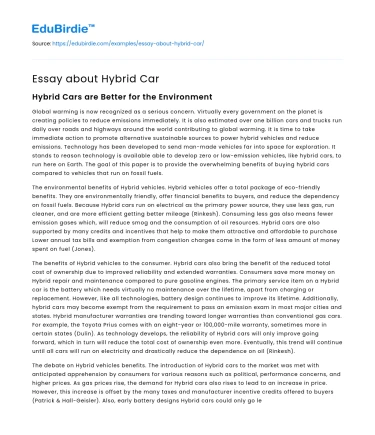Hybrid Cars are Better for the Environment
Global warming is now recognized as a serious concern. Virtually every government on the planet is creating policies to reduce emissions immediately. It is also estimated over one billion cars and trucks run daily over roads and highways around the world contributing to global warming. It is time to take immediate action to promote alternative sustainable sources to power hybrid vehicles and reduce emissions. Technology has been developed to send man-made vehicles far into space for exploration. It stands to reason technology is available able to develop zero or low-emission vehicles, like hybrid cars, to run here on Earth. The goal of this paper is to provide the overwhelming benefits of buying hybrid cars compared to vehicles that run on fossil fuels.
The environmental benefits of Hybrid vehicles. Hybrid vehicles offer a total package of eco-friendly benefits. They are environmentally friendly, offer financial benefits to buyers, and reduce the dependency on fossil fuels. Because Hybrid cars run on electrical as the primary power source, they use less gas, run cleaner, and are more efficient getting better mileage (Rinkesh). Consuming less gas also means fewer emission gases which, will reduce smog and the consumption of oil resources. Hybrid cars are also supported by many credits and incentives that help to make them attractive and affordable to purchase Lower annual tax bills and exemption from congestion charges come in the form of less amount of money spent on fuel (Jones).
Save your time!
We can take care of your essay
- Proper editing and formatting
- Free revision, title page, and bibliography
- Flexible prices and money-back guarantee
The benefits of Hybrid vehicles to the consumer. Hybrid cars also bring the benefit of the reduced total cost of ownership due to improved reliability and extended warranties. Consumers save more money on Hybrid repair and maintenance compared to pure gasoline engines. The primary service item on a Hybrid car is the battery which needs virtually no maintenance over the lifetime, apart from charging or replacement. However, like all technologies, battery design continues to improve its lifetime. Additionally, hybrid cars may become exempt from the requirement to pass an emission exam in most major cities and states. Hybrid manufacturer warranties are trending toward longer warranties than conventional gas cars. For example, the Toyota Prius comes with an eight-year or 100,000-mile warranty, sometimes more in certain states (Dulin). As technology develops, the reliability of Hybrid cars will only improve going forward, which in turn will reduce the total cost of ownership even more. Eventually, this trend will continue until all cars will run on electricity and drastically reduce the dependence on oil (Rinkesh).
The debate on Hybrid vehicles benefits. The introduction of Hybrid cars to the market was met with anticipated apprehension by consumers for various reasons such as political, performance concerns, and higher prices. As gas prices rise, the demand for Hybrid cars also rises to lead to an increase in price. However, this increase is offset by the many taxes and manufacturer incentive credits offered to buyers (Patrick & Hall-Geisler). Also, early battery designs Hybrid cars could only go less than 50 miles, much less than the mileage per tank we’re used to in today’s gas cars (Steele). But, like all technology, the batteries now used in Hybrid cars have drastically improved. In fact, it is believed by the auto industry that most cars, trucks, and semis will soon be electric. In addition, Hybrid manufacturers like Toyota, are now offering longer warranties on Hybrid cars.
Conclusion
Hybrid cars will soon be the majority vehicle of demand replacing the conventional gas cars that run on fossil fuel today. With the now top concern of global warming and the accepted truth that emission gases must be drastically reduced immediately, Hybrid cars are the clear choice for a solution. They are environmentally friendly, reduce emissions and smog, come with financial benefits for consumers, and reduce reliance on fossil fuels. Consumers will realize a reduction in the total cost of ownership with reduced repair costs and increased warranties offered by manufacturers. Potential consumers who think Hybrid cars do not offer value and performance compared to gas vehicles will soon realize today's Hybrid cars are nearing if not exceeding the same performance and prices as today’s conventional gas cars. Electric-powered cars will soon be the majority of vehicles on our roads. With a Hybrid car purchase, consumers would realize the financial benefits of tax credits and incentives and would be contributing to the reduction of emission gases to help save our planet for their children and future generations.
Works Cited
Paragraph 1
- Jones, Thomas. “Why Hybrid Cars Are Beneficial to the Environment.” Singapore Travel Guide, 2019, www.streetdirectory.com/travel_guide/57640/cars/why_hybrid_cars_are_beneficial_to_the_environment.html.
- Rinkesh. “Advantages and Disadvantages of Hybrid Cars.” Conserve Energy Future, 3 Jan. 2017, www.conserve-energy-future.com/advantages-and-disadvantages-of-hybrid-cars.php.
Paragraph 2
- Dulin, Jon. “Do Hybrid Cars Save You Money? The Answer Will Surprise You.” MoneySmartGuides.com, 4 Sept. 2019, www.moneysmartguides.com/are-hybrid-cars-worth-the-price.
- “10 Reasons Why Buying a Hybrid Car Is a Good Idea.” Www.proudgreenhome.com, Guest Post Courtesy Amanda Kostina/Whitefence.com, 23 Sept. 2013, www.proudgreenhome.com/news/10-reasons-why-buying-a-hybrid-car-is-a-good-idea/.
Paragraph 3
- Steele, Jason. “Hybrid Cars Pros and Cons - Benefits & Problems.” Money Crashers, 10 June 2019, www.moneycrashers.com/hybrid-cars-pros-cons/.
- George, Patrick E., and Kristen Hall-Geisler. “5 Reasons Not to Buy a Hybrid.” HowStuffWorks, HowStuffWorks, 31 Aug. 2009, https://auto.howstuffworks.com/5-reasons-to-not-buy-hybrid.htm.






 Stuck on your essay?
Stuck on your essay?

